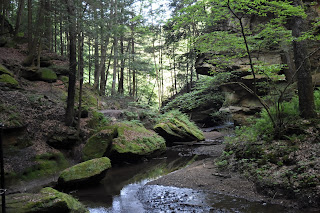There's a certain slant of light that always inspires me to quote Emily Dickinson inappropriately, not that she's complaining. Maybe if she'd spent a little less time cogitating and more time weed-whacking, she'd have seen those slants of light less gloomily.
If Emily had been walking with me in the woods this morning when the air was so thick with fog that I was soaked through in minutes, if she'd been walking beside me when I set out on the trail slowly and with much misgiving because of pain and stiffness caused by my inability to stay on my feet while weed-whacking (of which more later), if she'd joined me in gloomy resolution to keep walking despite the dank surroundings that echoed my inner weather, perhaps she might have wondered at my response to that certain slant of light that burst through the fog, lit up damp green leaves, and lifted my spirits enough to put new hope and resolve into my every step.
I marvel at the power of a simply slant of light to change my mood, but I despair of ever catching that power in a photograph or conveying in words how light shining through trees can make me want to keep on walking through the darkest woods. I always think of Emily Dickinson's "certain slant of light" at those times, but Emily was clearly writing about a different light from the one I find so exhilarating. Her light oppresses, afflicts, hurts, convicts, reminding us of the inescapability of death, as only a New England winter afternoon light can do; the light that leads me forward through the woods lifts oppression, evoking wonder at the constant renewal of nature.
I needed that slant of light this morning. Yesterday afternoon I spent way too much time sitting in a long, futile meeting, and when I finally got home I decided that I might just have time to finish the weed-whacking out back before the dark clouds released their deluge, and indeed I did have time to finish but not without mishap: I slipped on wet clippings, fell down the slope, twisted my back, and caught myself with a hand that landed neatly in a poison-ivy patch. Very nicely choreographed if I do say so myself. A quick shower washed away the poison ivy oils but could not calm the pain in my back, which stiffened up so much that I had trouble sleeping and then had trouble getting up and moving.
I ought to just stay home, I told myself. I ought to just sit here and sulk over what a useless klutz I am, and while I'm at it I can shop online for one of those little scooters old people use when their mobility is permanently impaired. Let's just thoroughly embrace the sedentary life--after all, nobody ever fell down a hill into a poison-ivy patch while sitting on the sofa, right? Who needs to walk around anyway? Let the world come to me!
Foolish thoughts indeed, so I forced myself to hobble out the door, drive halfway to Jackson, stop at a nature preserve so far out in the middle of nowhere that if I'd perished no one would have happened upon my remains for a long long time, and set out into the woods, slowly, stiffly, with little hope of completing the hike without tears. I trudged forward, hunched under the backpack, not even bothering to take out the camera because of the pervasive fog. Nothing looked too photogenic anyway: trees, creeks, rocks, more trees, whatever. I saw some small limbs and tulip-poplar blossoms tossed to the ground by yesterday's storm, smiled at the shapes of leaves on sassafras saplings, wondered how that deer managed to bound so quickly up a nearly vertical slope, but mostly I just kept telling myself to keep going because if I'd stopped in the middle of the woods in that kind of mood, I might never have gotten going again.
And then the light broke through. Who knows why these things happen? One minute I was a bundle of gloom trudging through a dank fog, and then the woods lit up as if someone had flipped a switch. There's a certain slant of light--that lifts, that cheers, that banishes my evil mood and keeps drawing me back to the woods even when my body calls out to merge with the sofa. It's an experience that can't be predicted, engineered, or manufactured; the only thing I can do is be there, with my eyes open, even if I'd rather be somewhere else.
See, Emily? Better look quickly before it goes away.





























